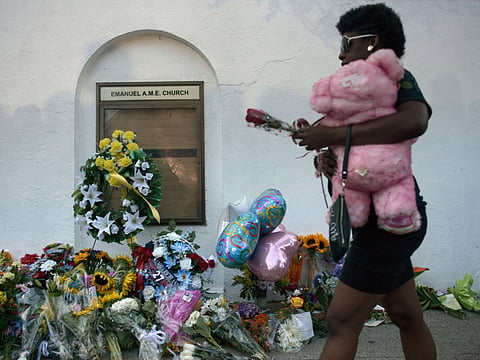Victims of America’s racist present
In America, you can be subjected to white supremacy for driving while black, walking while black, swimming while black and now praying while black — as the Charleston massacre shows

The Charleston massacre at Emanuel African Methodist Episcopal Church ought to put to rest the lie that if black people are just good enough, we will be left to live in peace.
We are so often told that if we did not just did not break the law in the first place, or resist arrest, or walk around with our spines upright and our spirits joyful that we would not face broken spines and the murder of both body and soul. But the list of things black Americans cannot do without the fear of being murdered grows week by week and day by day — and it is gathering up increasingly passive and pacifist activities. The doing-while-black factor (“Driving While Black” from New Jersey to Ferguson, “Walking While Black” in Florida, “Swimming While Black” in Texas) now must also include “Praying While Black” in church.
Not that the nine people who were allegedly killed by a white, male American terrorists are the first African Americans to give their bodies and their lives for Praying While Black: In 1963, the bombing of the 16h Street Baptist Church in nearby Birmingham, Alabama, took the lives of four little black girls and injured a fifth girl, Sarah Collins Rudolph.
All of them had gone to church to give thanks to the Lord and four of them lost their lives to a racist killer.
Rudolph — who is still alive, but lost an eye in the bombing, is losing vision in her remaining eye, can no longer work, struggles to remain insured and has never received any help from the government — is not a victim of America’s racist past. She continues to be a victim of America’s present, wilful desire to ignore America’s ongoing racism and its collective desire to want reminders of that racist violence kept out of sight and out of mind.
The collective denial of ongoing racism allows America to ignore differentials in infant mortality and overall life expectancy and to classify the deaths of nine people killed in church as the alleged victims of a mentally ill individual rather than a racist terrorist.
America has but barely advanced as a nation since the civil rights battles of the 1960s, as black people still face the slow violence of health disparities and economic inequality and the fast violence of just being killed. It is hard to see how Americans come very far from the mentalities of the American Civil War, considering that the Emanuel AME Church is on Calhoun Street (named after the former US vice-president who, with his dying breath, advocated the rights of slaveholders and states rights) and that the Confederate flag (the most potent symbol of the South’s desire to maintain slavery) still flies at South Carolina’s state capital every day.
Has America advanced at all since the founding of the republic? Denmark Vesey, an early leader of Emanuel AME, was born before the American Revolution. He was hanged in 1822, after helping to plot a slave rebellion — an effort to take their freedom — along with more than 30 others.
Has America honoured their ultimate sacrifice at all, considering that nearly 200 years later, another Emanuel leader — Clementa Pickney, who organised against the lynching of Walter Scott and fought for police to wear body cameras — was killed inside the very church that Vesey and his freedom fighters had built?
That church which was burned down after Vessey was killed, rebuilt, made illegal in 1834, and destroyed by an earthquake in 1891 — only to become the site of terrorism in 2015.
I felt teary watching black children whose childhood was blown out of the water at a pool party last week — especially when white supremacy focused on the imaginary gun the black teenagers did not have rather than on the real gun the cop pulled. I feel sick to my stomach thinking about Emanuel church preparing to bury at least nine of its own, nearly two centuries into its fight against racism. How many people must lose an eye, be bombed, get shot or otherwise die younger than white people before we collective scream in anger that black life is not valued in this country?
How many others must suffer before we confront the systemic and ongoing ways in which racism obviously and persistently kills?
I grew up in church. The folks that show up on a Wednesday evening are the best of the best — the people who are looking out for their communities and making sure everyone makes it through the week. My revulsion at this act of terrorism happened in black church on a Wednesday night is twofold: I’m horrified that nine lives have been stolen, destroying life as it was known for countless families and an entire congregation; I’m nauseated that the good folks taking care of their communities on Wednesday nights will now do so with varying degree of terror forever.
— Guardian News & Media Ltd



